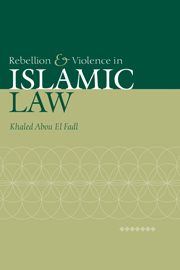Book contents
- Frontmatter
- Contents
- Preface and acknowledgments
- Introduction
- 1 Modern scholarship and reorienting the approach to rebellion
- 2 The doctrinal foundations of the laws of rebellion
- 3 The historical context and the creative response
- 4 The rise of the juristic discourse on rebellion: fragmentation
- 5 The spread of the Islamic law of rebellion from the fourth/tenth to the fifth/eleventh centuries
- 6 Rebellion, insurgency, and brigandage: the developed positions and the emergence of trends
- 7 The developed non-Sunnī positions
- 8 Negotiating rebellion in Islamic law
- Works cited
- Index of names
- Index of subjects
Preface and acknowledgments
Published online by Cambridge University Press: 15 December 2009
- Frontmatter
- Contents
- Preface and acknowledgments
- Introduction
- 1 Modern scholarship and reorienting the approach to rebellion
- 2 The doctrinal foundations of the laws of rebellion
- 3 The historical context and the creative response
- 4 The rise of the juristic discourse on rebellion: fragmentation
- 5 The spread of the Islamic law of rebellion from the fourth/tenth to the fifth/eleventh centuries
- 6 Rebellion, insurgency, and brigandage: the developed positions and the emergence of trends
- 7 The developed non-Sunnī positions
- 8 Negotiating rebellion in Islamic law
- Works cited
- Index of names
- Index of subjects
Summary
About ten years ago, this book started out as an exploration into the subject of political violence and terrorism in the modern Islamic world. I was particularly interested in the contemporary juristic treatments of rebellion and irregular warfare. At the conceptual level, the idea that the state ought to have a monopoly over the use of force against its foes appeared to me to be profoundly unreasonable. It seemed confounding that a fairly small armed elite is empowered to use force against some people (usually dissidents) in the name of all the people (the faceless masses). The many theories of representation and delegation of authority failed to make this proposition more coherent. At the same time, the idea that all individuals and groups in society should be armed and empowered to inflict damage upon each other did not make better sense. Therefore, I was interested in examining the ways in which the so-called guards of justice and order, namely the institutions of law, negotiated the resolution of conflicts in situations where order is frustrated and justice is challenged. After spending a couple of years reading on the issue, I became thoroughly bored. As far as the secondary literature was concerned, the cause of my boredom was not the lack of exciting books, essays, and otherwise learned treatises. What induced my boredom was that the methodologies and conclusions of many commentators were far more predictable than the dynamics and objectives of the movements they studied.
- Type
- Chapter
- Information
- Rebellion and Violence in Islamic Law , pp. viii - xiiPublisher: Cambridge University PressPrint publication year: 2001



